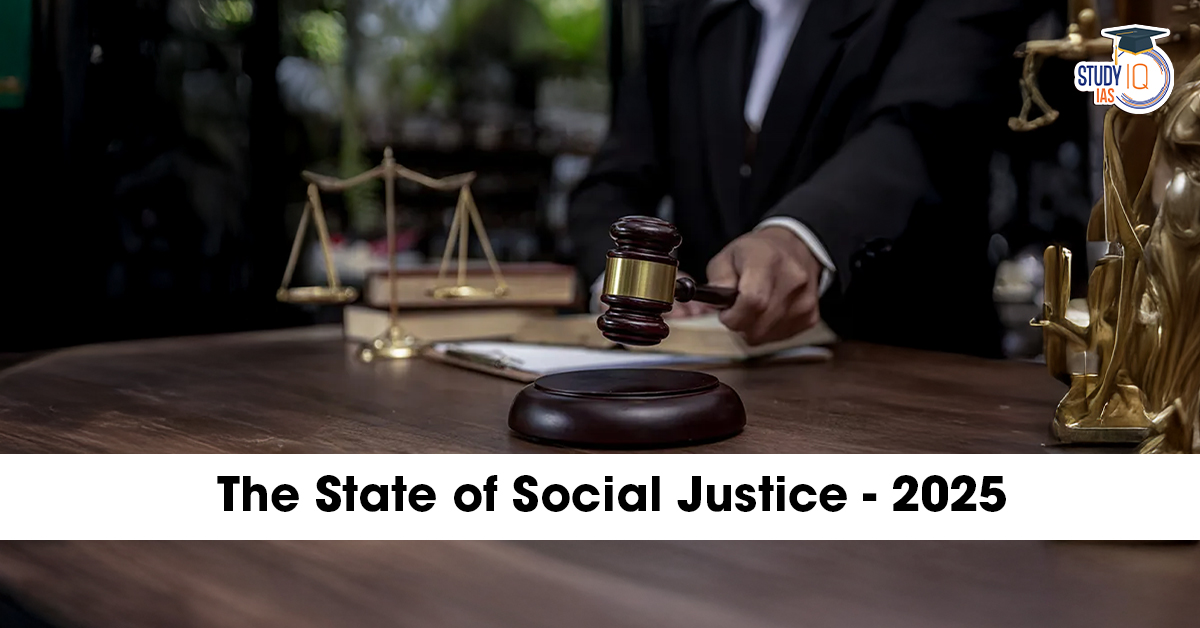Table of Contents
The International Labour Organization (ILO) released its flagship report, State of Social Justice 2025, on 23 September 2025. The report presents a comprehensive global overview of inequality, poverty, employment, gender gaps, and labour rights, emphasising that social justice is essential for peace, sustainability, and economic progress.
This report serves as a reminder that economic growth alone cannot guarantee fairness — strong institutions, political will, and inclusive governance must guide it.
What is the State of Social Justice Report?
The State of Social Justice 2025 is a biennial publication by the ILO that assesses how far the world has progressed towards achieving social justice — defined as equality of opportunity, fairness in income distribution, and universal human rights at work.
It uses 50+ data indicators across four main dimensions:
-
Basic Human Rights and Capabilities
-
Equal Access to Opportunities
-
Fair Distribution of Outcomes
-
Fair Transitions (Climate, Technology, Demography)
Key Highlights of the Report
1. Progress Achieved Globally
-
Child Labour Reduction:
Global child labour rates dropped from 20.6% in 1995 to 7.8% in 2024, a major step towards human dignity. -
Educational Access:
Secondary school completion rates rose by 22 percentage points since 2000, showing significant improvement in educational inclusion. -
Decline in Poverty:
-
Extreme poverty fell from 40% (1995) to 10% (2023).
-
Working poverty dropped from 27.9% (2000) to 6.9% (2024).
-
-
Rising Labour Productivity:
Global labour productivity per worker increased by 78%; in upper-middle-income countries, it rose by 215%.
Productivity inequality between nations fell by around 40%.
2. Persistent Challenges
Despite progress, the report warns that inequality, informality, and gender gaps remain major obstacles.
-
Poverty and Basic Services:
Around 800 million people still live on less than USD 3/day, and 1 in 4 people lack access to safe drinking water. -
Inequality in Income and Wealth:
The top 1% control 20% of global income and 38% of wealth, reflecting deep structural disparities. -
Gender Inequality:
The gender gap in labour force participation has narrowed by only 3 percentage points since 1995. -
Informal Employment:
Nearly 58% of global workers remain in informal jobs — lacking protection, security, and social benefits. -
Weakening Labour Rights:
The report notes an erosion of collective bargaining and freedom of association, undermining worker representation.
3. The Three Major Transitions of the 21st Century
The ILO identifies three defining global transitions that must be managed fairly and inclusively to ensure social justice:
a. Climate Transition
-
Green jobs must replace lost ones through sustainable labour policies.
-
Environmental policies should protect vulnerable workers and regions.
b. Technological Transition
-
Automation and AI must not widen inequality; they should empower workers through digital skills and innovation access.
c. Demographic Transition
-
Aging populations and youth unemployment require adaptive social protection systems and inclusive job creation.
4. Recommendations: The Path Toward Social Justice
The ILO recommends a “Triple A” Framework for fair transitions:
-
Apply – Strengthen existing labour and social institutions to manage transitions.
-
Adapt – Modify policies to respond to emerging challenges in climate, tech, and demography.
-
Amplify – Integrate social justice principles across economic, environmental, and social policies.
Additional ILO Recommendations
-
Strengthen universal social protection.
-
Promote inclusive collective bargaining.
-
Invest in education, digital literacy, and green skills.
-
Foster international cooperation to tackle transnational inequality.
5. Why This Report Matters for India and UPSC
For UPSC aspirants, the State of Social Justice 2025 is a vital document under:
-
GS Paper II: Governance, Social Justice, and Welfare Schemes
-
GS Paper III: Economic Development, Employment, and Inclusive Growth
-
Essay Paper: Topics on inequality, poverty, and sustainable development
The report aligns with India’s goals under SDG 8 (Decent Work) and SDG 10 (Reduced Inequalities), making it relevant for government policy formulation and international cooperation.
Conclusion
The ILO State of Social Justice 2025 report underscores a critical truth — social justice is not a byproduct of economic progress, but a prerequisite for it. While the world has reduced poverty and improved productivity, the persistence of inequality and exclusion demands urgent action.
Achieving “a fairer future for all” will require renewed commitment to labour rights, social dialogue, and equitable economic growth. As the report states, justice and sustainability must go hand in hand.


 Navigating Uncharted Waters: What Next f...
Navigating Uncharted Waters: What Next f...
 Astronaut Reentry Explained: How Spacecr...
Astronaut Reentry Explained: How Spacecr...
 Missile Interceptors Explained: Role in ...
Missile Interceptors Explained: Role in ...




















